Ever thought if eating more fruits and veggies could help your health goals? Adding the right ones to your diet can do more than just keep you healthy. It can lead you to a path of natural wellness.
These foods are not just for looks; they’re key to reaching your health goals. They help boost your immune system and improve your mental focus. But how can you use them to support your health journey?
We’ll explore each health goal with tips from trusted sources like the USDA and Harvard School of Public Health. You’ll learn how to use fruits and veggies to improve your health.
Quick Recommendation: Our blog takes you through fruits and vegetables for specific health goals. If you're interested in taking your knowledge to the next level, we recommend The Miraculous Power of Fruits and Vegetables.
Boosting Your Immune System
To keep your immune system strong, eating foods that boost immunity is key. Citrus fruits like oranges, grapefruits, and lemons are full of vitamin C. This vitamin helps immune cells work better. The National Institutes of Health says vitamin C can prevent and treat infections.
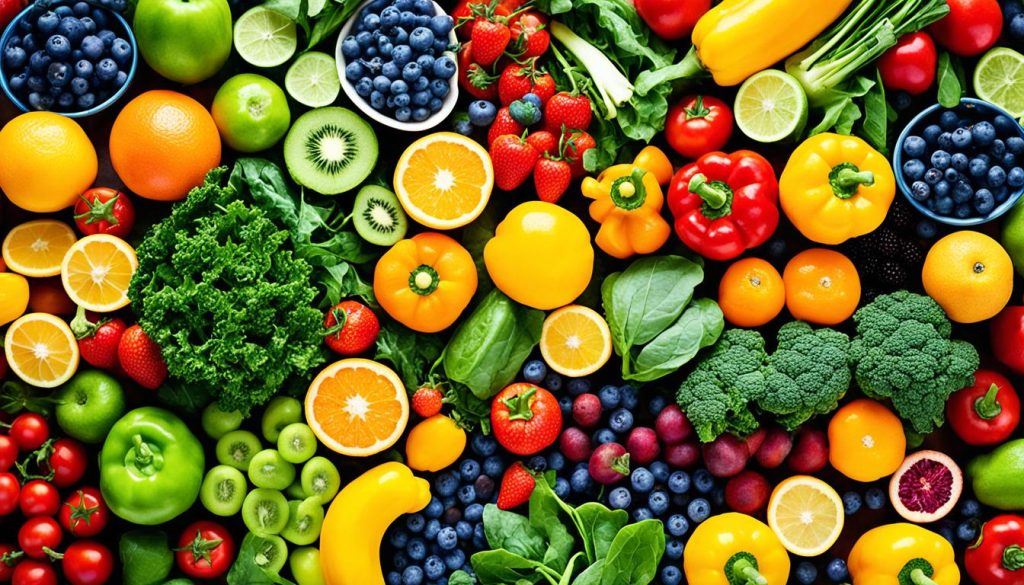
Leafy greens such as spinach and kale are also great. They’re full of vitamin E, an antioxidant that protects cells and supports the immune system. Studies in the American Journal of Clinical Nutrition show that vitamin E helps older people’s immune response.
For a strong immune system, eat both citrus fruits and leafy greens every day. The Nutrients journal talks about how eating different immune-boosting foods together works best. Mixing citrus fruits with leafy greens gives you lots of antioxidants and vitamins C and E. This helps your body fight off sickness. A simple smoothie or salad can be a great way to get these nutrients.
Eating these foods every day is important for a strong immune system. For example, start your day with an orange and have a spinach salad for lunch. This will help keep your immune system ready and able to fight off illnesses.
Improving Digestive Health
Adding more high-fiber fruits and vegetables to your diet can boost your digestive health. Berries like blueberries and raspberries, and veggies like broccoli and Brussels sprouts, are full of fiber. This fiber is key for a healthy gut, as studies from the World Gastroenterology Organisation show.
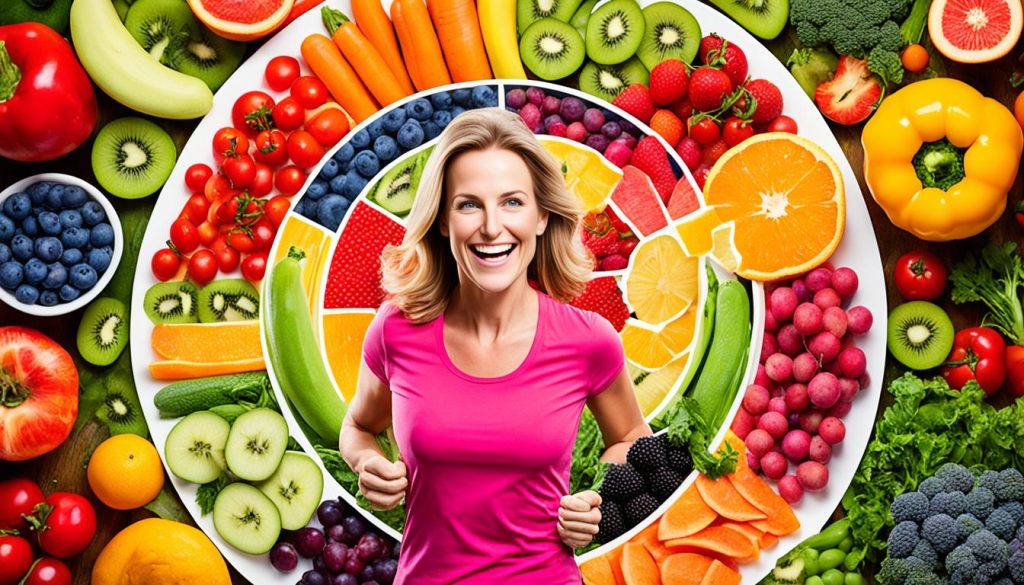
Fiber not only helps with digestion but also feeds good bacteria in your gut. Foods high in fiber are like food for these beneficial bacteria, as Nutrition Reviews explains. This keeps your gut balanced and safe from harmful bacteria.
The Gut journal says eating more fiber can lower the risk of digestive problems. This includes constipation, diverticulitis, and irritable bowel syndrome (IBS). So, make sure to include fiber-rich fruits and veggies in your meals to keep your digestive system healthy.
Enhancing Mental Clarity
The foods you eat greatly affect your mental clarity. Foods like avocados and blueberries, full of flavonoids, boost your brain power. They help with memory and focus.
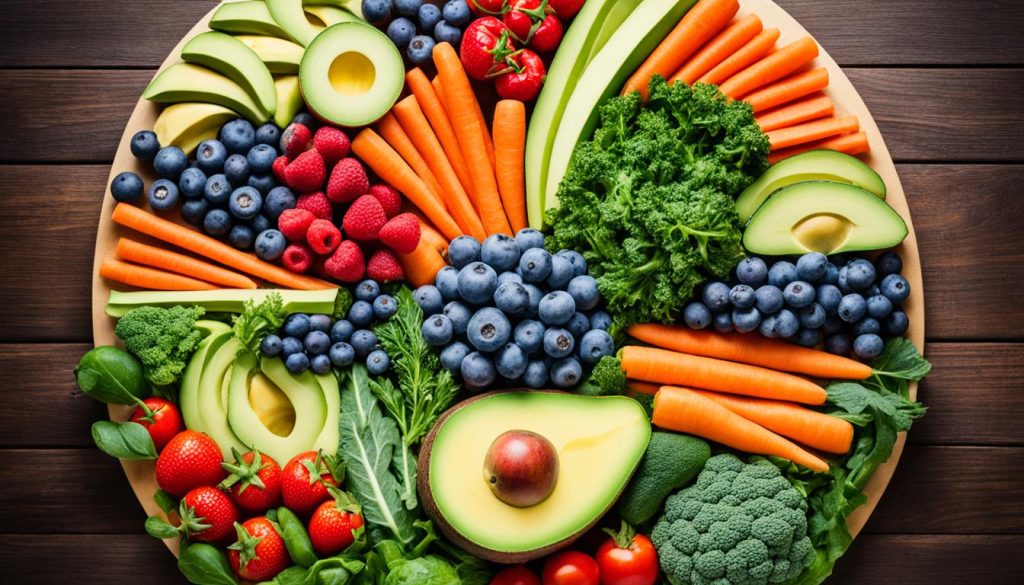
Studies show that flavonoids in blueberries can slow down brain aging. This means you can stay sharp as you get older. Avocados are also great because they have healthy fats. These fats help your brain by making sure it gets enough blood.
Experts say eating these foods is key for a healthy brain. “Frontiers in Aging Neuroscience” talks about how fruits and veggies help your brain over time. “Annals of Neurology” also found that eating these foods makes your mind quicker and more agile.
Adding these fruits and veggies to your daily meals is a smart move. It’s a natural way to keep your brain healthy and clear. So, making a smoothie bowl or just snacking on fresh produce helps your brain a lot.
Promoting Heart Health
Adding a heart-healthy diet to your daily meals is key for keeping your heart in top shape. Fruits and vegetables like tomatoes and spinach are great for your heart. They are full of potassium, which helps control blood pressure by balancing sodium.
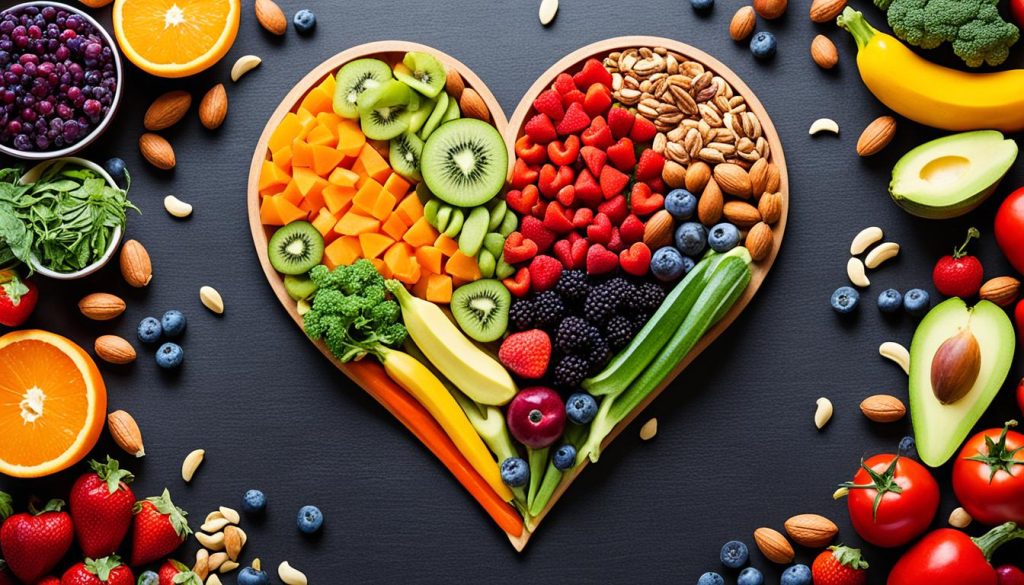
The American Heart Association says eating foods high in potassium can lower your risk of stroke and heart disease. Tomatoes are a top choice because they’re packed with potassium and lycopene. Lycopene is an antioxidant that helps keep cholesterol levels down and lowers heart disease risk.
Spinach is also a top pick for heart health. It gives you potassium, fiber, and plant sterols. Plant sterols are important because they stop your body from absorbing cholesterol, which can lower your cholesterol levels. Studies in the Journal of the American College of Cardiology show that eating plant sterols can cut down bad cholesterol.
The Circulation journal notes that eating these heart-healthy veggies often can lower your risk of heart disease. Adding tomatoes and spinach to your meals is a smart move for your heart. These foods are easy to add to many dishes, making them a great part of a heart-healthy diet.
Quick Recommendation: Our blog takes you through fruits and vegetables for specific health goals. If you're interested in taking your knowledge to the next level, we recommend The Miraculous Power of Fruits and Vegetables.
Managing Blood Sugar Levels
Choosing the right fruits and vegetables is key when managing diabetes. Foods with a low glycemic index are a good choice. They digest slowly, which helps prevent sudden spikes in blood sugar. Adding fiber-rich foods like leafy greens and whole fruits also helps with diabetes management.
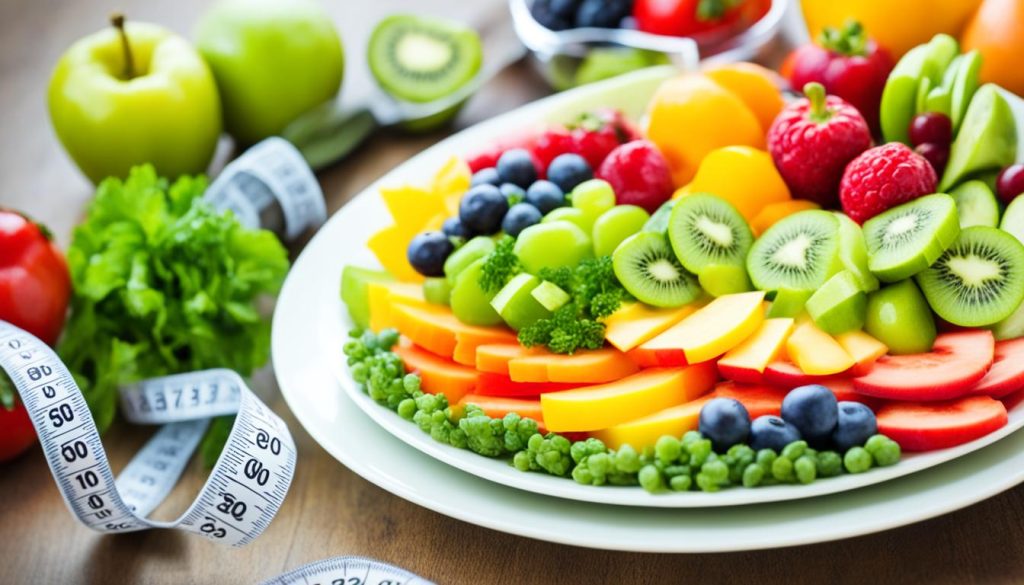
For a diet friendly for diabetes, include veggies like spinach, kale, and broccoli. These are low glycemic index foods that are packed with nutrients. They help keep blood sugar levels stable. Also, eating fresh fruits in moderation is good because of their high fiber content. This fiber slows down sugar absorption in the bloodstream.
Studies in the Diabetes Care journal show that eating a lot of fiber can help control blood sugar and improve health for type 2 diabetes patients. The Lancet also found that fiber-rich foods help with diabetes by making you feel full longer and reducing blood sugar swings.
Adding low glycemic index and fiber-rich foods to your meals can greatly improve blood sugar management. Just a handful of greens in your salad or a whole fruit as a snack can be a big step towards better diabetes control.
Supporting Weight Loss
Starting a weight loss journey can be tough, but eating more water-rich and high-fiber fruits and veggies can help a lot. Foods like cucumbers and apples are great because they’re low in calories but high in nutrients. They help you feel full without taking in too many calories.
Replacing high-calorie snacks with these foods is a good strategy for losing weight. Instead of grabbing a bag of chips, go for sliced cucumbers or an apple. Studies in Obesity Reviews and The Journal of Nutrition show how eating more fruits and veggies can help with weight control. They make you feel full for longer.
Research in the International Journal of Obesity also found that eating nutrient-dense foods leads to lasting weight loss. Choosing snacks that are low in calories lets you enjoy eating without feeling guilty. This supports your weight loss goals.
In conclusion, eating water-rich and fiber-filled fruits and veggies helps you eat fewer calories and get enough nutrients. This makes your journey to a healthier life easier.
Boosting Skin Health
Adding certain fruits and vegetables to your diet can greatly improve your skin health. Carrots are a great choice because they’re full of vitamin A. This vitamin helps fix skin tissue and prevents dry, flaky skin. Studies in the Skin Pharmacology and Physiology journal show that vitamin A is key for healthy skin.
Papaya is another great option for your skin. It’s packed with vitamin C and antioxidants that fight off free radicals. These free radicals can harm your skin and make you look older. A study in the Nutrients journal found that antioxidants keep your skin looking young by protecting it from damage.
Eating these foods can really show in your skin. Dermatologists from the American Academy of Dermatology suggest eating foods full of antioxidants and vitamins for a healthy glow. Adding these foods can make your skin look radiant and healthy.
By eating foods rich in antioxidants like carrots and papayas, you’re doing a lot for your health and skin. These vitamins and antioxidants help take care of your skin. This way, you’re giving your skin the best care possible.
Increasing Energy Levels
Are you looking for ways to boost your natural energy throughout the day? Adding certain fruits and vegetables to your diet can help a lot. Sweet potatoes, for example, are full of complex carbohydrates. These give you a steady energy supply, keeping you energized and focused all day.
Oranges are also a great choice because they’re high in water and natural sugars. These give you a quick energy boost. Plus, they’re full of Vitamin C, which helps with overall health and energy.
Complex carbohydrates in foods like sweet potatoes and whole grains release energy slowly. This helps prevent the afternoon slump. Adding leafy greens like spinach, which are rich in B vitamins, is also key for energy metabolism.
Adding these energy-boosting foods to your diet is easy. Start your day with a smoothie made with oranges and spinach. For lunch, try a baked sweet potato with black beans and steamed veggies. Snack on whole grain crackers with avocado in the afternoon for more energy.
Research from the International Journal of Food Sciences and Nutrition shows that fruits’ natural sugars and complex carbohydrates are great for energy. The Journal of Applied Physiology also found that eating a balanced diet with these can improve your energy metabolism. This leads to more energy throughout the day.
Conclusion
Eating a mix of fruits and vegetables is important for your health. It helps boost your immune system, improve digestion, and make your mind clearer. It also helps your heart, keeps blood sugar levels in check, aids in losing weight, improves skin health, and gives you more energy.
It’s key to eat a balanced diet with many fruits and vegetables. This way, you get lots of nutrients and support your health in many ways. By choosing a variety of foods, you can enjoy the special benefits each one offers. This helps you meet your health needs.
Make eating healthy a big part of your daily life. Use advice from trusted sources like the World Health Organization and the Centers for Disease Control and Prevention. This way, you can live a healthier life, feeling sure your diet is good for you.
Quick Recommendation: Our blog takes you through fruits and vegetables for specific health goals. If you're interested in taking your knowledge to the next level, we recommend The Miraculous Power of Fruits and Vegetables.

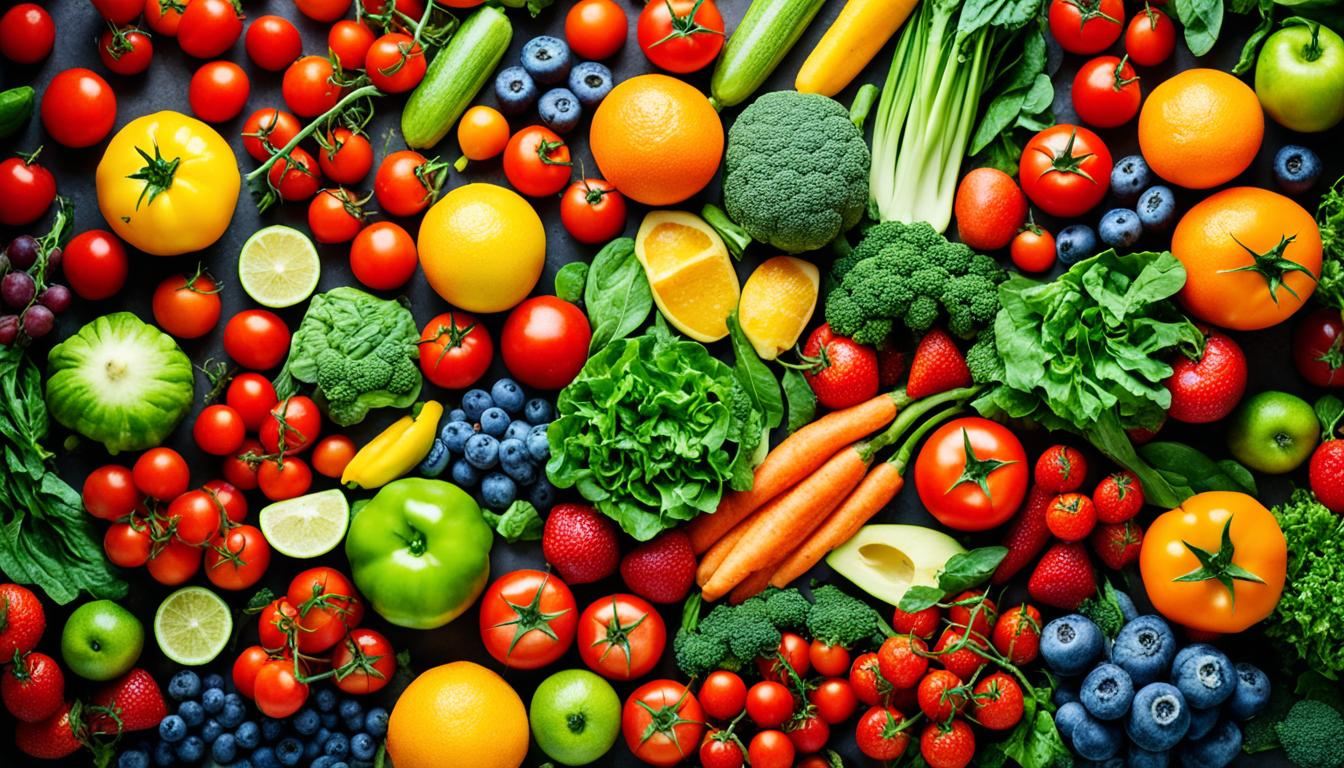
Your point of view caught my eye and was very interesting. Thanks. I have a question for you.